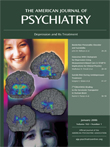How Should Remission From Depression Be Defined? The Depressed Patient’s Perspective
Abstract
OBJECTIVE: Although experts in the treatment of depression have suggested that achieving remission is the primary goal of treatment, questions remain about how remission should be defined. In antidepressant efficacy trials, remission is defined according to scores on symptom severity scales. Normalization of functioning is often mentioned as an important component of remission, although it is not used to identify patients with remission in treatment studies. The authors’ goal was to determine what depressed patients consider important in defining remission from depression. METHOD: A brief questionnaire was distributed to 535 psychiatric outpatients who were being treated for DSM-IV major depressive episode. They were asked to rate the importance of 16 statements in determining whether depression is in remission. RESULTS: The three items most frequently judged to be very important in determining remission were the presence of features of positive mental health such as optimism and self-confidence; a return to one’s usual, normal self; and a return to usual level of functioning. The patients endorsed a statement about absence of symptoms with nearly similar frequency. CONCLUSIONS: Patients aspire to a range of outcomes from the treatment of their depression.



